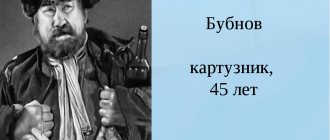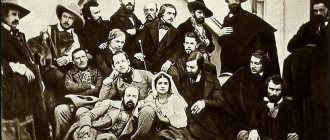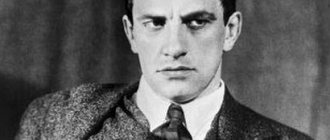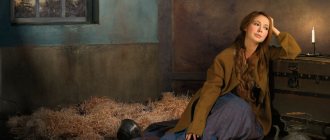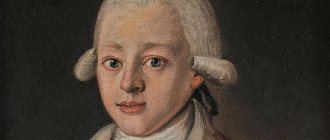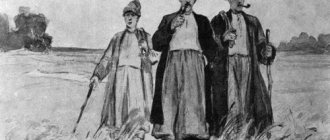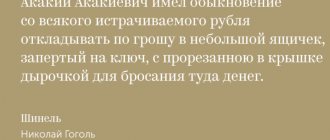N.V. Gogol. "Portrait". Retelling the content with quotes from the text.
Waking up, Chartkov remembered the dream, thinking, if only he had at least part of this money. In his imagination, “the bundles unwrapped, the gold glittered, and wrapped again.” The owner and the policeman came, demanding payment for the apartment. The owner did not agree that Chartkov repay the debt with paintings, as the quarterly suggested, since he did not like the artist’s paintings. Suddenly everyone heard the clink of coins; the policeman pressed too hard on the picture, in the frame of which there was a bundle of money. Chartkov promised to pay.He began to look at the 1000 gold chervonets, joyful, and thought that now he could work quietly for three years. But first he must “dress in a fashionable tailcoat, break his fast after a long fast, rent himself a nice apartment, go that same hour to the theater, to the pastry shop, to ... and so on - and he, having grabbed the money, was already on the street.”
Chartkov dressed up, rented a rich apartment, took a ride in a carriage. He met the old professor, but pretended not to notice him . He wanted to show his talent to the whole world , he already heard the words: “What a strong talent Chartkov has!” He ordered an article in the newspaper, which appeared under the title “On the extraordinary talents of Chartkov,” it was written: “Glorify yourself and us. We know how to appreciate you."
Literally the next day a lady came to order a portrait of her daughter. The artist already had a premonition of how he would create the portrait. However, the lady began to impose conditions: what her daughter should be depicted in, in what setting. The next day he continued his work, the lady again almost telling him what should not be depicted in the picture. “With sadness, he began to erase what his brush had forced to appear on the canvas. Many almost imperceptible features have disappeared, and along with them the similarity has partially disappeared.”
In the end, he created the portrait that the lady wanted. “The artist was rewarded with everything: a smile, money, a compliment, a sincere handshake, an invitation to dinner; in a word, he received a thousand flattering awards.”
Orders poured in. The artist fulfilled all the clients' wishes. “At first, the artist was challenged by such demands: all this had to be figured out, thought through, and yet very little time was given. Finally he figured out what the matter was, and there was no difficulty at all .”
Chartkov became a fashionable painter , he was invited to the richest houses. “ He now spoke sharply about artists and art: he argued that too much dignity had already been attributed to former artists.”
“No, I... I confess, I don’t recognize as art the fact that line after line is molded; This is a craft, not an art.”
Over time, he was already tired of writing , he only made sketches of the head, and the rest was completed by his students. boring for him . “His brush grew cold and dull , and he insensitively enclosed himself in monotonous, definite, long-worn forms .” Over time , even ordinary advantages were not visible on his canvases . Those who knew him before wondered where his talent had disappeared.
Chartkov began to get fat, in the newspapers he was called “our venerable Andrei Petrovich,” “our honored Andrei Petrovich.”
“Glory cannot give pleasure to those who stole it and did not deserve it ; it produces constant awe only in those worthy of it. And therefore all his feelings and impulses turned to gold. Gold became his passion, ideal, fear, pleasure, goal .”
But one day Chartkov was invited to an exhibition at the Academy of Arts to evaluate the work of a Russian artist who improved his skills in Italy, devoting everything to art.
Chartkov saw: “ pure, immaculate, beautiful , like a bride, stood before him the artist’s work.” Tears welled up in my eyes, a sob burst out in response to a question about the evaluation of the work. Chartkov ran out of the hall. I ran to the workshop. He realized with despair that he had wasted his talent. " God! and destroy so mercilessly the best years of your youth ; to destroy, to extinguish the spark of fire, perhaps, which was warming in the chest, perhaps, would now develop in greatness and beauty, perhaps, also tearing out tears of amazement and gratitude! And destroy it all, destroy it without any pity!”
He tried to create something, but he couldn't anymore. “...how mercilessly and ungratefully everything that came out from under his brush was!” Chartkov began to look at his works, written in his youth, and realized that he had talent .
He began to buy up all the talented paintings, emptied his bags of money, and spent the money on buying paintings. In the end, the hero went crazy and died.
Quotes from Gogol Nikolai Vasilievich
And bring Lyapkin-Tyapkin here
Words of the Mayor from the comedy “The Inspector General” (1836). This is how the Mayor imagines an inspection by an auditor (vol. 1, chapter 1).
Adopt greyhound puppies
From the comedy “The Inspector General” (1836). The judge (Ammos Fedorovich Lyapkin-Tyapkin) was fond of hunting and took bribes with greyhound puppies.
Are there really such fires, torments and such strength in the world that would overpower the Russian force?
From the story “Taras Bulba” (book “Mirgorod”, 1835). About the Cossack Taras Bulba, who managed to shout loudly and warn his comrades about the danger during his execution (Chapter XII).
You marvel at the preciousness of our language: every sound is a gift; everything is grainy, large, like the pearl itself, and, really, another name is even more precious than the thing itself
From a letter to N. M. Yazykov (December 2, 1844).
If God wants to punish, he will first take away the mind
In Russia, the expression is known as the words of the Governor, in the finale of the play “The Inspector General” (1836). The mayor pronounces it when it turns out that Khlestakov is not an auditor at all, but just a poor passing nobleman, and in his letter he ridiculed the mayor.
There is life in the old dog yet
From the story “Taras Bulba” (1835, included in the book “Mirgorod”). Taras calls on the Cossacks to go to battle and repeats this phrase several times - before the battle and during the battle (chapter IX).
Alive as life
From the article “What, finally, is the essence of Russian poetry” (1846).
Living abroad, one feels sick of Russia, and before you have time to come to Russia, one already feels sick of Russia
From a letter to N. M. SMIRNOV. September 3, 1837. Frankfurt., with reference to the words of the Russian writer Ivan Sergeevich Turgenev (1818 - 1883).
And what Russian doesn’t like driving fast?
From the poem “Dead Souls” (1842), part 1, chapter. 11 (from the last lyrical digression of part 1 of the poem, about Chichikov’s journey).
Truth is so rarely heard that just for one grain of it you can forgive any offensive voice, no matter how it is pronounced
From “Four letters to different persons regarding “Dead Souls”” (1843 - 1846), letter 1.
An auditor is coming to visit us
From the comedy “The Inspector General” (1836). Words of the Mayor (D. 1, Rev. 1).
Who said "uh" first?
From the comedy “The Inspector General” (1836). Dobchinsky and Bobchinsky talk about a new guest, who was later mistaken for an auditor. While telling this, they argued about who said “e” first (act. 1, appearance 3.).
Who are you laughing at? You're laughing at yourself!
From the comedy “The Inspector General” (1836). These are the words of the Governor, at the end of the work, when it became clear that Khlestakov is not an auditor at all, but an ordinary scoundrel (act. 5, appearance 8).
You're not taking it according to rank!
From the comedy “The Inspector General” (1836). With these words, the Mayor scolds (scolds) the policeman who took too large a bribe for his position (act. 1, appearance 4).
Well, brother Pushkin?
From the comedy “The Inspector General” (1836). Khlestakov (the supposed auditor), boasts to pretty women about his acquaintance with the great poet.
You need to treat your word honestly. It is the highest gift of God to man
From the article “ABOUT WHAT THE WORD IS” (1844).
I went for the sake of order, but returned drunk
From the comedy “The Inspector General” (1836). The mayor is looking for the policeman Prokhorov, who went to deal with the fight that had occurred, and returned drunk (act. 1, appearance 5).
Before introducing anything new, it is necessary not just somehow, but fundamentally to recognize the old
From the article “The Author's Confession” (1847).
A rare bird will fly to the middle of the Dnieper
From the story “Terrible Revenge” (1831) (included in the book “Evenings on a Farm near Dikanka”).
Night on the Dnieper. Kuindzhi A.I., 1882, Tretyakov Gallery
A decree, no matter how well thought out and defining it may be, is nothing more than a blank sheet, if there is not from below the same pure desire to apply it to the matter in the exact way that is necessary, which should be and which can only be seen by one who is enlightened by the concept about divine justice, not human justice
From Four letters to different persons regarding “Dead Souls” (1843 - 1846), letter 2. The writer discusses the problems, inconveniences of life in Russia and their causes.
The non-commissioned officer's widow flogged herself
From the comedy “The Inspector General” (1836). Mayor's response to a woman's complaint that she was unreasonably punished (flogged).
What, son, did your Poles help you?
From the story "Taras Bulba". This phrase is uttered by the Cossack Taras Bulba, addressing his son Andrei, who betrayed the Cossacks and went over to the side of the enemies of the Poles (Poles), having fallen in love with a girl from the enemy camp. The Cossacks were able to capture Andrei and Taras Bulba himself killed the son of the traitor (Chapter IX).
I gave birth to you, I will kill you
From the story "Taras Bulba". With this phrase, Cossack Taras Bulba addressed his son Andrei, before killing him for treason.
Minor characters from Gogol's story "Portrait"
The artist's father
. He lived in Kolomna, was a genius artist, persistently developing his talent. He achieved recognition and devoted his talent to high painting - Christian themes. He constantly received orders from the church. In one of the paintings he needed to depict the spirit of darkness, and he was just asked to paint a portrait by an Asian-looking moneylender who brought fear to the whole of Kolomna.
The work on the portrait of the moneylender yielded terrible results: the faces in the picture not only lost their holiness, but acquired a demonic expression, the artist himself became angry and envious, lost his wife and two children. Realizing what had happened, the painter sent his surviving son to the Academy of Arts, and he himself retired to a monastery, where he atoned for his sin through long repentance and fasting. Only after this did he paint a marvelous picture based on the gospel story.
The portrait brought misfortune to everyone who acquired it. The artist, who had become an old man, instructed his adult son to destroy the portrait if he saw it.
Moneylender
- a man of Asian appearance, known throughout Kolomna. He gave money on favorable terms, but misfortune befell all his borrowers. The figure is undoubtedly demonic. Anticipating his death, he came to the artist with a request to paint his portrait. In this image, he remained to live and continue to bring evil.
Artist
. He told the story of the portrait. The son of a recognized painter, he graduated from the Academy of Arts and lived in Italy, cultivating his skills. His father was the author of the ill-fated portrait; he instructed his son to destroy this work. The young man saw his father’s work at an auction, but while he was telling the crowd about the find, the portrait mysteriously disappeared, that is, it continued to sow evil.
Real art
The theme of art in Gogol's story “Portrait” is divided into 2 parts. The first side is pure creativity, which should bring pleasure. The real joy is the idea. She's got real talent. But art for making money is empty and has no value. And no one should do it.
The main character of Gogol's story "Portrait", an essay on which is written at graduation, is Chartkov. This is a talented and promising young man. The further storyline develops in the following order:
- At the very beginning, the teacher in the class warns Chartkov that he needs to preserve his talent and write works for the soul.
- If you engage in creativity to earn money, then the true purpose of the artist is lost; this is the wrong path.
- The hero first follows this principle and lives as a creator.
- But over time, he finds himself in poverty, he did not have enough money for anything. He wanted to get rich and live in normal conditions.
As a result, he began to use art as a way to earn money. But when the dreams come true, everything turns out to be wrong. Real art leaves him completely, and means the death of his talent in every sense.
useful links
Check out what else we have:
- for the most rational - Summary of “Portrait”
- for the busiest – Reader’s diary “Portrait”
- for the most curious - Analysis of “Portrait” (Gogol)
Work test
- Question 1 of 14
Selected Ideals
When fate gives the hero of the work an impressive sum, he decides to spend it on developing his talent. Chartkov invested in advertising and secured the arrival of many wealthy clients. But it turned out that there is also a dark side of the coin, which does not please the artist at all and turns into problems.
Trying to keep up with fame and earnings, he loses all his talent . For him, painting portraits turns exclusively into a craft, which is slowly becoming more and more annoying and boring. And a return to true creativity is no longer possible due to the fear of losing a stable income from orders.
That is, Chartkov only has the skill with which he earns money. At the same time, true art closed its doors to him forever.
This becomes a real blow, one portrait ruined his life. Now he is just a craftsman who is not destined to return to his roots, Chartkov has fallen into a real trap.
The main characters of Gogol's story "Portrait"
Chartkov Andrey Petrovich
- a young talented artist. At the beginning of the story he is 22 years old. He is poor and hungry, but, on the advice of the professor, he tries to resist the temptation to become a fashionable portrait painter for the sake of a well-fed life. Chartkov cultivates his talent and polishes his skills.
Once, with his last two kopecks, he bought from a shopkeeper a portrait of remarkable craftsmanship, but the eyes of the Asian man in the portrait were terrifying in their liveliness and expression. The artist experienced the impact of this searing gaze at home, and at night he had a strange dream with chervonets. In the presence of the portrait, the young man began to grumble about poverty and irritation against the professor, who urged him to be patient.
In extreme circumstances, when the threat of eviction hung over the artist, a bundle with a thousand ducats fell from the frame of the portrait. Good intentions to start a good workshop, buy everything necessary for work and improve further soon went to waste.
Chartkov began to live in luxury, paint portraits of the nobility, gained fame, wealth and ruined his talent. Seeing the real skill of other artists, he began to experience black envy, buy up their paintings and destroy them. Only after the death of the unfortunate man the fate of the masterpieces was revealed.

